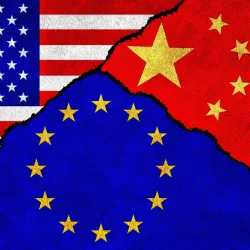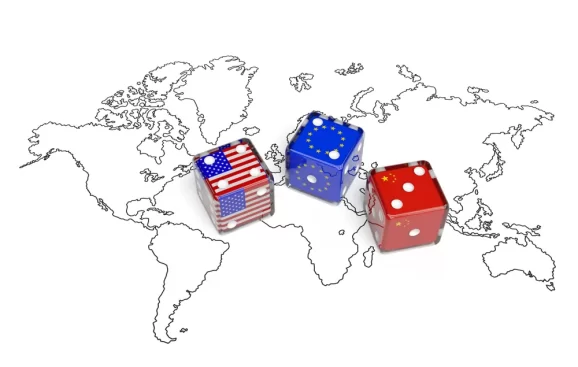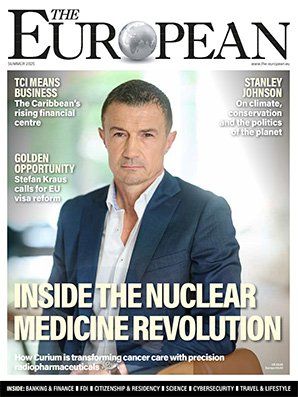Is Europe stuck between China and the USA?

Should the EU engage in a subsidy race with China and the USA? To protect its businesses within the internal market, it may also use another option, says Thomas Weck of Frankfurt School of Finance and Management
Almost unnoticed, an important new legal instrument for controlling subsidies from third countries came into force in the EU on 20 January this year. For decades, the belief existed that the development of a globalised economy was a shared and accepted policy imperative and that the process of globalisation would increase the welfare of all nations participating in it. The governing idea was that suppliers should have equal opportunities and their customers alternatives. In the global economy, equal conditions should exist also across national borders. However, that ideal world has never existed. The economic conditions have remained unbalanced. Trade across borders has been becoming increasingly difficult as well.
A clear symptom that globalisation may have reached its limits is the failure of the World Trade Organization (WTO). In the West, the United States has taken measures that are not always compatible with international trade rules. At the same time, it has eliminated the WTO’s arbitration mechanism for trade disputes by blocking its appointment. In the East, China has become a member of the WTO, but has not developed into a market economy in the Western sense, as had been hoped.
The confrontation between the U.S. and China has grown over the years. In August 2022, the U.S. launched its own subsidy programme, the Inflation Reduction Act, as a sort of counterpart to the Chinese state’s strategic control and financing of the economy. The proposal is to invest around $300bn in deficit reduction and $369bn in energy security and climate change programmes over the next ten years, while reforming licensing procedures. American industry is explicitly set to benefit.
The Europeans have been caught in the middle. This may be not a problem for all EU member states to the same extent, but it is certainly a big problem for central European states such as France and Germany. Indeed, the German economy is particularly vulnerable to suffer from disruptions if trading across borders becomes more difficult.
In the past, Germany managed to export more and higher-quality products than it imported. In return, capital flowed into the country. As a consequence, the German economy is highly interdependent with foreign economies. In good times, Germany profits from the foreign demand in its products. But interdependence comes along with dependency. This becomes relevant in times of crises. The Germans became painfully aware of their dependencies when they lost Russia as a gas supplier last year. For several years, they have also been subject to increasing pressure from the Americans to rethink their relations with China.
The EU is currently struggling to find a common line to meet the challenges of a changing global economic climate. One possibility would be to reduce costs for local companies by cutting state bureaucracy and tax burdens, thus strengthening the attractiveness of the domestic business location. But such reforms are known to be difficult – politicians have cut their teeth on this so far. It remains to be seen whether “Pillar 2” – a project for uniform minimum taxation of large companies – adopted by the EU Council in December will bring about a tangible simplification in practice.

Flirting with subsidies
Another option would be to simply put a lot of money in their own hands and massively subsidise their own industry, just like the U.S. is doing. The European bureaucracy and individual EU member states are currently flirting with subsidies. The EU Commission presented its plans at the end of January. Those plans include a “Net-Zero Industry Act”, which aims at giving “green energy” technologies in the EU a boost and to take back the production of such technologies where it moved to China and other countries in the past. In addition, the proposed Act should strengthen EU norms and standards that are relevant for industrial supply chains. The EU Commission proposes moreover to relax EU control for aid that member states grant to companies in the EU economic interest. The same would be true for aid to support firms competing with subsidised firms from third countries.
Among other measures, the EU Commission further recommends the strengthening of EU funding tools. The EU will indeed have an advantage if it takes funding decisions into its own hands. Subsidies are hardly subject to any control if they are granted from EU funds. By defining its own policy objectives, the EU can also control the subsidies granted by individual member states. In the context of the so-called Green Deal of the EU, the EU institutions may be able to apply these two levers in parallel. However, there is a lack of resources for subsidies on a scale comparable to that in the USA. This is true both at the EU level and across the member states.
In principle, there is a third option. Namely, do what we can to defend the principles on which the European single market is built. It is based on equal opportunities for all market participants (“undistorted competition”) and free trade across borders. The single market may not work without disruptions, but it is still a major achievement of the European Union.
To protect the single market, the EU institutions adopted a novel legal instrument (Regulation 2022/2560) in December 2022. This instrument subjects companies that receive third-country subsidies for activities in the EU’s internal market to controls similar to those already in place for recipients of member state aid. To this end, the EU Commission will be given the general power to conduct investigations against recipients of third-country subsidies. If the damage to fair competition outweighs the Union’s interest in the subsidy – foreign investment should remain welcome – it can be ordered that the subsidy be repaid or that other measures be taken to mitigate its distortive effects.
Fair conditions for all market participants
With regard to corporate takeovers and government procurement, where the subsidy is passed on to the seller or the procuring government, there are two specific sub-instruments. Mechanisms are also provided to neutralise the problem that relevant information is regularly located outside the EU and is not available here. The new instrument, if applied consistently, could help to ensure that fair conditions are enforced for all market participants in the EU single market and that subsidy effects are neutralised. Chinese and American companies engaging in business activities on EU markets would then not have advantages simply because they are backed by the state. Conversely, the countries here could refrain from opening their own coffers, which the taxpayer will have to fill again. However, the protection of EU companies abroad would require additional measures of a different nature, i.e., strong anti-dumping and anti-subsidy instruments that are applied based on reciprocity principles.
Of course, those who believe that the state is the better entrepreneur or investor in case of doubt will trust that the subsidies from the EU and member states will somehow pay off. In that case, the new instrument could eventually prove superfluous. If, on the other hand, the state’s main task is to improve regulation and not to get embroiled in private business, the new instrument, which subjects companies that receive third-country subsidies for activities in the EU’s internal market to controls similar to those already in place for recipients of member state aid, could be a building block.
In the best case, it might later be flanked by the reduction of superfluous bureaucracy. Because unlike subsidies, smart regulation does not undermine one’s own credibility vis-à-vis the U.S. and China.
ABOUT THE AUTHOR

Thomas Weck is Associate Professor of Public Law, Regulatory Law and Comparative Law at Frankfurt School of Finance and Management and a member of the Frankfurt Competence Centre for German and Global Regulation (FCCR) since September 2022. Previously, he was a senior analyst at the Monopolies Commission in Bonn, which recommended that the German government support the new instrument on foreign subsidies.


